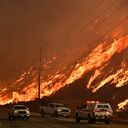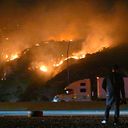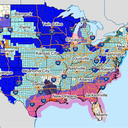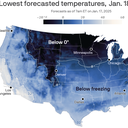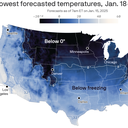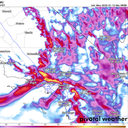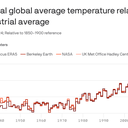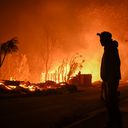Ending USAID climate programs could boost security risks
The US Agency for International Development (USAID), which Elon Musk has vowed to "kill" with President Trump's support, could destabilize regions where human-caused climate change is hitting particularly hard.
Why it matters: By ending humanitarian assistance and proactive climate resilience and adaptation programs, the U.S. military could get pulled into responding to more future crises.
- Experts tell Axios that axing the agency completely, or even significantly downsizing it, would have security implications when it comes to climate change.
Catch up fast: USAID, an independent, operational agency now potentially moving under the State Department, conducts a variety of projects in climate-vulnerable locations such as Africa, Central America and parts of Asia.
- These include programs meant to help boost the resilience of agricultural production to extreme weather events and make infrastructure better able to withstand such events.
Zoom in: According to archived versions of USAID's websites, the agency helps countries cut their emissions, conserve carbon-rich tropical rainforests and rely more on renewable energy sources.
- "Climate change affects nearly everything we do at USAID," its climate page stated as of Jan. 17, according to the Internet Wayback Machine.
- "As such, the Agency mainstreams climate change considerations across much of our development and humanitarian assistance work."
What they're saying: Curtailing USAID is "going to add substantially to the instability in these volatile regions, because vulnerable populations will be doing without," Sherri Goodman, a senior fellow at the Wilson Center and board chair at the Council on Strategic Risks, told Axios.
- "Instability morphs, as we've seen in certain regions where insufficient governance, you don't have access to the basics, and there's a vacuum created and that also allows for other malign actors to come in," she said.
- She said it's a choice between paying "a little bit now" to help make regions "more resilient to food and drought shocks, or pay more later by having to send American sons and daughters into conflict areas."
A pullback in foreign aid could also benefit China, which may step into the void to offer its aid and earn more favor in Africa and elsewhere, Goodman and others said.
- "Trump's decision to shut down USAID has frozen critical work to deliver vital assistance around the globe, and put China in the driver's seat," Sen. Chris Van Hollen (D-Md.) tweeted.
Between the lines: The Pentagon and U.S. intelligence agencies view climate change as a national security threat, in part because it has the potential to force military assets to respond to more humanitarian emergencies.
- Human-caused global warming could also result in more conflicts, including skirmishes over natural resources such as water.
- Some studies have already tied climate change to certain deadly conflicts, including the civil war in Syria.
- By being proactive with aid and on-the-ground programs, USAID provides the U.S. with a way to head off future crises before they get to that point.
For example, USAID, along with other agencies, operate a famine early-warning system to predict them before they occur, and direct aid to where it is needed most.
- The agencies also distribute food aid from U.S. farmers to those who need it most, which can cut down on migration that could destabilize countries or send waves of immigrants to the U.S.
What's next: It's currently unclear what USAID's fate will be given Musk's intense focus on it in recent days and Secretary of State Marco Rubio's statement that he is now the acting USAID administrator.
- Sen. Brian Schatz (D-Hawaii) is placing a "blanket hold" on Trump's State Department nominees in response to USAID actions, the WSJ reports.
Go deeper:
What to know about USAID, the federal agency Musk vowed to kill
Where USAID funds are disbursed around the world





